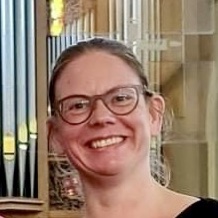

ABOUT MARSJA MUDDE
- Medieval and Renaissance specialist and soprano Marsja Mudde (Ridderkerk, 1976) was fascinated from an early age by increasingly older classical vocal music.
My name is Marsja Mudde, singer and singing teacher
Singing ensemblemusic and solorepertoire from the medieval, renaissance and baroque periods I see as my vocation. In order to beautifully perform this music, stylespecific vocal techniques are needed, and one must pay extra attention to what else is sounding in your surroundings. This music often is not available in modern musicnotation and therefore has to be read from the original manuscripts or early prints, or has to be transcribed expertly. Performance directly from these sources to my opinion has much added value as compared to using a transcription, since the singer more or less is forced to listen to what the others do and because the fluency of his own part with the old neumes or ligatures comes to its own much better. This artisanal work I like so much, that I also enjoy very much passing it on to others. This I do in the singing classes and courses I give, but also in the blog I write and in the book and book chapter I have published.

In my work as a singer and teacher of Early Music, I experience a deep contact with my surroundings. I do not only mean the obvious contact with my audience, but also the connection between myself and the other ensemblemembers. Moreover, this music asks for using the available acoustics to the full. Besides that, it is almost unavoidable in performing this music to also establish a link with the universe, with what is bigger than us, or – if you can relate to that – with God. In my working with ensembles and as a soloist, I hope that these connections are sensible.
Early Music often is religious or at least has its origins in a culture with a deep spiritual or religious awareness. I believe that this is the ‘magic’ of this music and that my skills depend on my understanding of these cultural historic backgrounds. Besides, it is important to understand and analyse the language or dialect and the musical composition of the piece. This brings me to an interpretation as original as possible. That is also why these backgrounds are always given to the audience of my concerts and performances, and of the CD’s and other audiovisual media I published, in the form of detailed explanations of the programmes, and in my interviews.